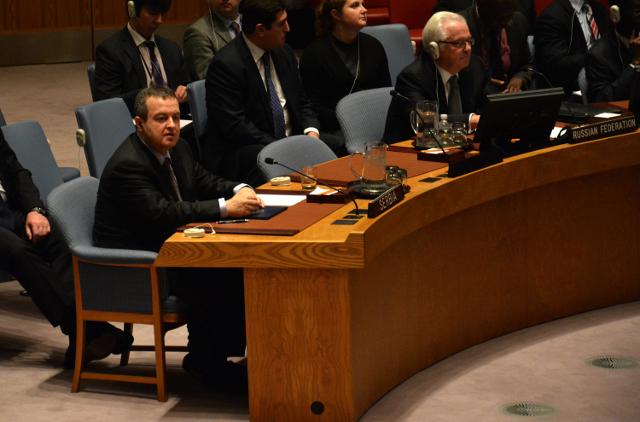
Serbia cannot be "a punching bag" for representatives of Kosovo institutions on occasions such as UN Security Council sessions.
This was the message of Serbian Minister of Foreign Affairs Ivica Dacic, who pointed out that Belgrade "is not afraid" and that negotiations with Pristina represent "our strength, not weakness."
"As much as Serbia is trying to extend a hand, we have nobody to extend it towards," Dacic said, reacting strongly to the address during a UN Security Council session on Kosovo by Kosovo's ambassador to the U.S., Vlora Citaku.
Noting that statements such as those made by Citaku "do not contribute to trust but are setting us back," the Serbian foreign minister stressed that he had not heard Citaku say a single sentence on the topic of the meeting, and that is the situation in Kosovo now.
"Serbia is not present in Kosovo since 1999. So what does Serbia have to do with your internal problems? You lecture Serbia, and you know what happened to the witnesses in the case of Haradinaj at the Hague Tribunal. They are no longer alive. So is that cooperation with the Hague Tribunal?," asked Dacic.
He criticized Citaku because she "speaks about crimes, but not about the crimes against Serbs."
"You talk about Serbs practically not living in Kosovo, that they were soldiers and policemen. How can you speak like that? You know very well that Serbs were a majority in Kosovo several centuries ago, these are historical facts," said Dacic addressing Citaku.
He recalled that there is a large number of Serb historical, religious and cultural monuments in Kosovo, which, he added, Citaku is well aware of.
"What are you trying to say - that 200,000 Serbs should not return to Kosovo? You have no right to say that. Kosovo is neither yours nor mine, neither Albanian nor Serb, but of those who live there, ie. citizens of Kosovo, and those are also Serbs," Dacic said.
He then asked Citaku "if, when speaking about national minorities in Serbia, she is trying to say that a Kosovo national minority lives in Serbia."
"There is an Albanian one. It cannot be an Albanian national minority that is both yours, and of those in Tirana. You're talking about a people's right to self-determination - a people who have already used this right and have their own state, Albania," Dacic said.
The Serbian foreign minister then warned members of the UN Security Council that "what happened to Serbia can happened to any of them tomorrow."
He also thanked all the countries that have not recognized the unilaterally proclaimed independence of Kosovo - "not because they respected Serbia, but because they respected the principles of international law."
He asked representatives of the EU, the U.S. and Britain to, when speaking with representatives of Serbia on the eve of such sessions, "bear in mind that Serbia cannot be a punching bag for representatives of Pristina institutions."
"If you think we are afraid of that, you are wrong. And that we are negotiating, it is not our weakness but our strength," concluded the minister.
Citaku replied by saying that "Kosovo is not afraid to tell its story and to be proactive in dealing with its past."
"We had a dreadful war, but no one should try to put an equal sign between the crimes committed under the sponsorship of the state and individual actions," said Citaku.
She said that Pristina will implement all agreements reached, but not those that erode the functioning of "the state of Kosovo."
Speaking earlier during the session dedicated to UN secretary-general's regular report on Kosovo, Dacic said that radicalization of the political scene and deterioration of the security situation represented a threat for the population of Kosovo, and that the most vulnerable were returnees in ethnically mixed communities, Beta agency reported.
No comments:
Post a Comment